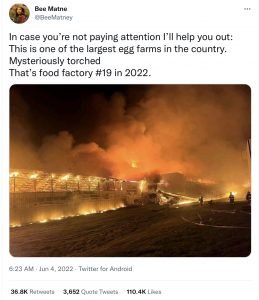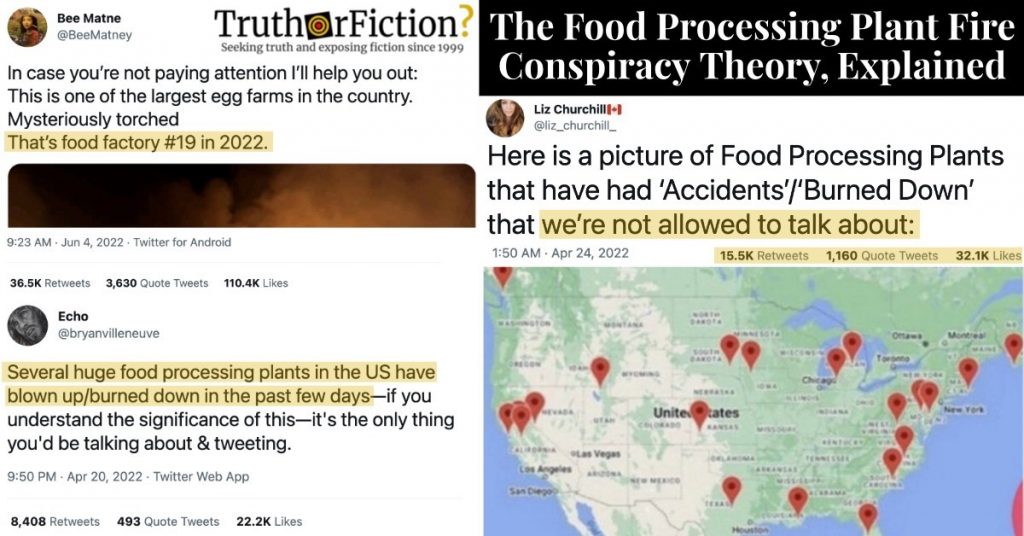
A June 4 2022 tweet about the latest in a purported string of food processing plant fires (or “food factory” fires) built on other, similar narratives in order to go viral:
The tweet addressed others who might be “not paying attention,” and shared a photograph of a structure fire. They asserted that the image was a photograph of “food factory #19 in 2022,” which was “mysteriously torched”; the image did not link to any additional information from a news source.
A reverse image search did match the image to a May 29 2022 WCCO article about a fire at Forsman Farms, “Tens Of Thousands Of Chickens Killed In Wright County Egg Farm Fire.” A May 29 2022 KMSP piece about the incident included a statement from Forsman Farms about the blaze:
“Overnight, a fire destroyed one of our barns at our Howard Lake farm. No one was injured and we are grateful that first responders were quickly on scene to put out the fire. Unfortunately, chickens were lost because of the fire. We are evaluating the extent of the damage – which appears to be confined to a single structure – as well as investigating the cause of the fire.”
Both articles were published shortly after the Forsman Farms fire was reported, and both mentioned the possibility of the loss of thousands of egg-laying chickens. Broadly, the Forsman Farms fire was an excellent example of the manner in which the rumors spread (not unlike a fire), contrasted with largely ignored subsequent reporting.
While that story was true, engagement around that fire appears to have been conflated with another fire at another plant that same night, this one in Pennsylvania and adding weight to the narrative of a pattern.
On June 1 2022, the Reading Eagle reported on the cause and extent of that fire, showing that it was far less destructive than originally thought:
Initial reports indicated multiple chicken houses were aflame, but crews arriving on site found that only a single house was affected … [Cyle Manmiller, Frystown deputy chief] said that while there was smoke throughout the house, crews kept the fire to within about 30 feet from where it started, and only 20 or 30 of the house’s 28,000 chickens died.
“With all the dust and shavings in there, it could light up so fast,” Manmiller said. “That’s why we were as aggressive as we were.”
Manmiller said the flames ignited when sparks and melted plastic from a shorted-out chicken feeder fell onto the wood shavings that the chicks use as bedding.
Manmiller added that “99.9” percent of chickens were spared, and that the affected structure was quickly restored to full functionality — not likely to cause a massive egg shortage, in other words.
How Many Food Processing Plants Exist in the United States, and Are Reported Fires Cause for Alarm?
Looking closer at the narratives, the food factory fire rumors seemed to exemplify the logical fallacies of “hasty generalization” and “begging the question“:
Hasty Generalization: Drawing a conclusion based on a small sample size, rather than looking at statistics that are much more in line with the typical or average situation.
Begging the Question: The fallacy of begging the question occurs when an argument’s premises assume the truth of the conclusion, instead of supporting it. In other words, you assume without proof the stand/position, or a significant part of the stand, that is in question. Begging the question is also called arguing in a circle.
In the context of 50 states and more than 300 million Americans, 19 is a tiny number of incidents. Even if we assumed that states averaged only 20 food processing facilities in each state, 19 would still then be under two percent.
Establishing a count for how many food processing plants were in the United States in 2022 was not straightforward, and the preceding years of unusual events has likely changed the landscape to some degree. According to information updated by the United States Department of Agriculture (USDA) in December 2021, figures from 2017 were the most recent available:
There are many food and beverage processing establishments (plants) in the United States—36,486, owned by about 31,401 companies in 2017, according to the most recent comprehensive data in the Census Bureau’s 2017 Economic Census.
As of 2017, the USDA counted nearly 36,500 food processing facilities across the United States, or an average of 728 per state. Applying the same figure cited in the tweet, the mysterious 19 food factory fires (at least one of which had almost no impact) represented a not-so-alarming .052 percent of all food processing plants in the country.
Is 2022 a Year of Mysterious Food Factory Fires?
On May 4 2022, FactCheck.org addressed the food fire rumors in the context of an April 2022 segment on Tucker Carlson’s Fox News show.
The fact check described Carlson’s segment, and analyzed specific incidents mentioned by Carlson. One example involved a plane crash near a General Mills facility — which, like the subsequent Forsman Farms fire, was a lot of fretting over something extremely minor:
One of the most widely shared versions of the claim about the fires came from Tucker Carlson, who highlighted the rumors on the April 21 [2022] episode of his Fox News show, which has an average of 3.62 million nightly viewers according to the most recent Neilson ratings
“Food processing plants all over the country seem to be catching fire,” Carlson said at the start of the segment. He featured conservative talk-radio host Jason Rantz as an expert, who said that there had been “well over a dozen” examples of this within “the last few weeks.” But the show included a total of nine examples since January 2021 … Carlson wrapped up the interview, saying, “An hour ago a plane crashes into a General Mills facility. We’d already planned this segment. I’m sorry, the onus is on people who think that’s a conspiracy theory to explain what is going on, what are the odds of that? I have no idea.”
We don’t know what the odds are of a plane crashing into a General Mills facility shortly before Carlson went on the air either. But we’ll explain what we do know about the evidence for the claim that there has been a suspicious increase in fires at food processing plants using the examples given on Carlson’s show, since that’s the most high-profile version of the claim.
To start with, a plane didn’t crash into a General Mills building. Rather, as described by a local Fox News affiliate that covered the Covington, Georgia accident, “the plane went down in a remote section of the plant’s property where empty trailers are stored about 300 feet away from the building itself.”
The plane was a twin-engine Cessna 340 flown by a pilot in training, police told a local newspaper.
A General Mills spokeswoman confirmed to us that the crash hasn’t impacted food production or distribution, saying in an email, “On April 21 [2022], a small plane crashed near the General Mills Covington, GA cereal and snack manufacturing facility. No employees were harmed, the plant did not experience any disruptions and it remains fully operational.”
Predictably, Carlson padded his figures by reaching back to January 2021. Two days earlier (on May 2 2022), the National Fire Protection Association (NFPA.org) published something of a debunking of the viral rumors.
The NFPA described Carlson’s segment as something of a flashpoint in the rumors’ trajectory, and contextualized the reports in terms of the frequency of structure fires. The organization also addressed the reasons food processing plants were likelier to experience fires than other facilities:
Experts say there’s no credence to recent internet rumors that a number of fires at food processing plants across the country are suspicious or in some way linked.
“It’s not unexpected to see fires in these kinds of structures,” said Birgitte Messerschmidt, director of the NFPA Research division. “Fires are not a rare occurrence. We had 490,000 structure fires in 2020 in the United States. We see a lot of fires every year.”
[…]
The truth, however, is that nothing is unusual about any of the fires that have occurred in food processing plants over the first few months of the year. Although no data is kept on fires that occur strictly at food processing facilities, the National Fire Incident Reporting System tracks fires within broader categories like manufacturing, refrigerated storage, and agricultural facilities. In 2019, the number of fires at all manufacturing or processing plants in the country topped 5,300—nearly 15 a day. Additionally, more than 2,000 fires occurred in agricultural, grain and livestock, and refrigerated storage facilities, which could all include food processing operations.
Messerschmidt said food processing plants, like most industrial facilities, are prone to fires. “Food is fuel,” she said. “So as soon as you’re operating with food, you have something that is combustible.” On top of that, Messerschmidt added, you may have heat from cooking, high-pressure systems, combustible dusts, and other risk factors for fires and explosions present at these facilities.
In terms of math, the number of fires in food facilities in 2022 was not cause for alarm. In terms of the likelihood of fires, the claim was also meritless.
A Google search for “food processing plant fires” prioritized fact checks over conspiracy theories. Unfortunately, the first visible result was a paid advertisement advancing the conspiracy theory:

The third link in that search was a Federal Emergency Management Agency (FEMA) document [PDF], “U.S. Fire Administration/Technical Report Series Chicken Processing Plant Fires.” If users didn’t click through to the PDF report, they might miss that it was published in 1991.
If Food Factory Fires Aren’t Really More Common, Why is the Rumor Spreading?
Fact checks often demonstrated that the rumor was baseless, but few addressed the purported objective of intentional food supply sabotage.
It didn’t take much digging to locate some threads of discourse in late May and early June 2022, where commenters often referenced “the Great Reset” when advancing the rumors:
A Wikipedia entry for “Great Reset” summarized the concept and the conspiracy theory:
The Great Reset is the name of the 50th annual meeting of the World Economic Forum (WEF), held in June 2020. The meeting soon became the focus of multiple conspiracy theories. It brought together high-profile business and political leaders, convened by Charles, Prince of Wales and the WEF, with the theme of seizing upon the global crisis to rebuild society and the economy following the COVID-19 pandemic.
[…]
The term “Great Reset” can also refer to a conspiracy theory, named after the conference. According to a November 22, 2020 article as part of BBC’s “Reality Check” series debunking the theory, those spreading the Great Reset conspiracy theory claim, without evidence, that a “group of world leaders orchestrated the pandemic to take control of the global economy.”
Ongoing global supply chain shortages — exacerbated to the extreme by Russia’s invasion of Ukraine and targeting of its food infrastructure — also were used to fuel the spread of the rumors:
An April 29 2022 Daily Beast item about the rumors (“The Right’s New Conspiracy Theory: Kamikaze Planes and Food Fires”) observed that the purported objective of sabotaging food production facilities was typically left open-ended among those who had nothing but fear to peddle:
Even the arson theory’s proponents have struggled to explain the motivation behind launching an elaborate attack on food processing plants. There are often vague insinuations that Joe Biden’s administration is behind the “attacks,” or that the fires are to blame for rising food prices. But it’s rarely explained why Biden would want to induce a famine ahead of the midterms by, for example, sabotaging a Hot Pockets facility.
All the same, right-wing personalities have theories. On the far-right personality Stew Peters’ show, one pundit claimed nefarious forces—bent on causing a repeat of the Ukrainian Holodomor famine—were behind the industrial accidents.
Even Carlson, the conspiracy theory’s most prominent proponent, struggled to figure out whether the number of fires was even notable.
“What are the odds of that?” Carlson said. “I have no idea.”
A thread on Reddit’s r/preppers was unexpectedly met with reasonable comments. The most upvoted comment on the thread explained:
I work for an engineering company and all we basically do is design factory cells for customers. I’ve been to god knows how many different warehouses and plants at this point. I also used to work in industrial safety. Food plants and warehouses catching on fire is sadly not that uncommon. Just in 2021 I was personally in a 2 food warehouses that had fires. Both were arson by disgruntled employees. And in the past I’ve seen several fires from improper safety training and housekeeping. Housekeeping is INCREDIBLY important but it’s one of the first things to go. Every warehouse and every factory has a whole maintenance shop and in most of those you have metal working tools. Metal shavings with machine oil is surprisingly flammable and can get out of hand quick. Then you have issues like people smoking where they shouldn’t, you’d be surprised how many people sneak a cigarette or vape inside. And then a horrifying amount of fire extinguishers and other fire protection systems are not kept up, and haven’t been kept up worse during Covid.
Also, you have to remember that fear sells and some news agencies can make bank on that. So, instead of comparing numbers to previous years or scaling them to show the actual percentages it sounds like it’s happening a lot, and it kinda does, but it isn’t a new thing. We just didn’t really talk about it much before unless you were in safety or had to deal with OSHA junk.
All of this is to say that this is likely not anything new to worry about, and even if you are concerned if you have a little stored up food you’re set. Google food warehouse near your location and I promise you there will be a ton unless you live in the middle of nowhere and then there will just be a small ton. There are so many more than people realize
Editing to add I just did that and I have 22 within 30 miles of me in the south. That’s not even including stuff like the Walmart and other chains distribution plants. This is just the ones that deal with places like dollar general and piggly wiggly and restaurants.
A moderator of the subreddit also weighed in, advising users take the claims with a grain of salt:
Likely new staff (COVID layoffs, etc,) accidents, cutting corners to save costs, and good-old bad luck.
Considering many plants are likely operating at a higher capacity than normal, or intermittently due to supply chain issues, the level of risk will rise.
That’s….basically it. Remember, Fox News is basically Infowars lite. (i.e. not accurate info.)
Never attribute to conspiracy what can be easily explained by average stupidity, company greed, ignorance, or neglect.
In a thread on r/skeptic mentioned an April 28 2022 tweet with over 15,000 retweets. In it, the user made the obviously false claim that “we’re not allowed to talk about” food factory fires (except for on Fox News, in every news outlet, in several fact checks, constantly on Twitter, and in dozens of Reddit threads):
Another thread on a conspiracy-focused subreddit included comments speculating on why food processing plants might be sabotaged. As was often the case with this particular set of rumors, no primary thread of speculation was dominant, and all commenters seemed to accept without question that it was an unusual and ominous development, thereby spreading the narrative still further:
Summary
From April 2022 onward, rumors of a sudden uptick in food factory fires or food processing plant fires spread virally, receiving a boost from far right television presenter Tucker Carlson in late April 2022. Despite multiple debunkings by everyone from fact checkers to fire safety organizations, discourse persisted. The “food fire” rumor’s staying power seemed in part to be its flexibility — Carlson left the “question” of cause open, and conspiracy-minded people attached their villain of choice to the rumor. Bill Gates, Joe Biden, the World Economic Forum, and the “Great Reset” were all popular cited causes, illustrating that the narrative would likely persist and be adapted into myriad future manufactured panics.
Correction, 6/6/2022, 4:46PM: This article has been edited to clarify that there were two fires at two different facilities on the same day. -bb
- In case you’re not paying attention I’ll help you out: This is one of the largest egg farms in the country. Mysteriously torched That’s food factory #19 in 2022. | Twitter
- Tens Of Thousands Of Chickens Killed In Wright County Egg Farm Fire
- Massive fire breaks out at commercial egg farm near Cokato, Minn.
- Fire companies made fast stop on chicken house fire in northwest Berks
- Hasty Generalization | Logically Fallacious
- Begging the Question | Texas State Philosophy Department
- Food and beverage manufacturing | USDA.gov
- Unfounded Claims About Frequency and Causes of Food Plant Fires
- Nothing to See Here Recent fires at food processing facilities have some claiming there’s more going on than meets the eye. Experts aren’t convinced. | NFPA
- Food processing plant fires | Google Search
- Chicken Processing Plant Fires | FEMA
- Great Reset | Wikipedia
- The Right’s New Conspiracy Theory: Kamikaze Planes and Food Fires
- fires at food plants | Reddit

